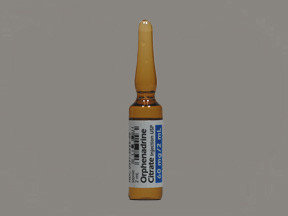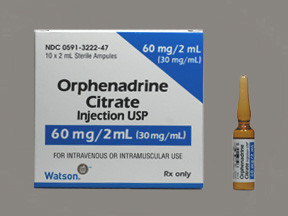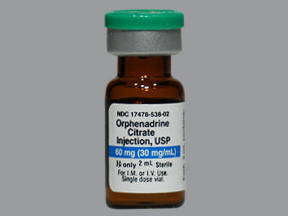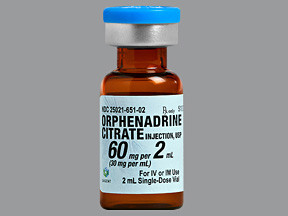ORPHENADRINE - INJECTION
PHONETIC PRONUNCIATION: (or-FEN-a-dreen)
COMMON BRAND NAME(S): Norflex
GENERIC NAME(S): orphenadrine citrate
Uses
USES: Orphenadrine is used to treat muscle spasms/pain. It is usually used along with rest, physical therapy, and other treatment.
How to use ORPHENADRINE - INJECTION
HOW TO USE: This medication is given by injection into a vein or muscle by a health care professional. It is given as directed by your doctor, usually twice a day (every 12 hours). If this medication is injected into a vein, it should be given over 5 minutes while you are lying down. Continue to lie down for 5 to 10 minutes after the injection to reduce dizziness and lightheadedness. To continue to control your symptoms, your doctor may switch you to a form of orphenadrine that is taken by mouth. Tell your doctor if your condition does not improve or if it worsens.
Side Effects
Precautions
Interactions
Overdose
Images
Reviews
Faq for ORPHENADRINE - INJECTION
Orphenadrine injection is used to relieve muscle spasms and pain caused by various conditions, such as sprains, strains, and other musculoskeletal injuries.
Orphenadrine works by blocking the action of certain chemicals that cause muscle spasms. It helps relax and relieve muscle tension, thereby reducing pain.
The recommended adult dosage for Orphenadrine injection is 60-120 mg injected intramuscularly or intravenously every 12 hours. However, the dosage may vary depending on the severity of the condition and individual response.
Common side effects of Orphenadrine injection may include drowsiness, dizziness, dry mouth, blurred vision, constipation, and urinary retention. Serious side effects such as allergic reactions and increased heart rate are rare but should be reported to a healthcare professional if experienced.
Orphenadrine injection is not recommended for use in children under 12 years old, as its safety and effectiveness have not been established in this age group.
Orphenadrine may interact with other drugs, including antidepressants, anticholinergics, and certain antihistamines. It is essential to inform your healthcare provider about all medications, supplements, or herbal products you are taking before starting Orphenadrine injection.
Orphenadrine should be used during pregnancy or breastfeeding only if the potential benefits justify the potential risks. It is advised to consult a doctor before using this medication if you are pregnant or breastfeeding.
Orphenadrine injection usually starts working within 30 minutes to an hour after administration. However, individual response may vary.
Orphenadrine injection is usually administered by a healthcare professional in a clinic or hospital setting. It is not typically self-administered at home.
Disclaimer
IMPORTANT: HOW TO USE THIS INFORMATION: This is a summary and does NOT have all possible information about this product. This information does not assure that this product is safe, effective, or appropriate for you. This information is not individual medical advice and does not substitute for the advice of your health care professional. Always ask your health care professional for complete information about this product and your specific health needs.





No Reviews Yet